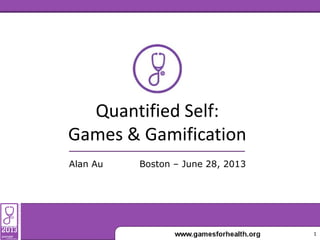Games for Health 2013 - Quantified Self: Games & Gamification
- 1. Quantified Self: Games & Gamification Boston ŌĆō June 28, 2013Alan Au 1
- 2. Biomedical informatics postdoc Game industry journalist Not a fashion/art director Not a quantified self expert http://twitter.com/#!/Alan_Au 2
- 3. What am I playing? 3
- 4. What is this talk about? Quantified Self Games & Gamification + = Games for Health? 1 2 3 4
- 8. What is data used for? ŌĆó Identity ŌĆó Research ŌĆó Commerce ŌĆó Health ŌĆó Curiosity ŌĆó Entertainment ŌĆó Understanding ŌĆó Improvement 8
- 10. 10 Self-tracking is the cool new thingŌĆ”
- 11. ŌĆ” but self-tracking isnŌĆÖt really new. 11
- 12. What do people self-track? ŌĆó Diet ŌĆó Exercise ŌĆó Mood ŌĆó Sleep habits ŌĆó Work habits ŌĆó Energy levels ŌĆó Personal performance ŌĆó Decision-making ŌĆó Happiness ŌĆó Overall health 12
- 13. How do people self-track? 13
- 15. Why do people self-track? ŌĆó How late can I drink coffee and still sleep well? ŌĆó WhatŌĆÖs contributing to my headaches? ŌĆó Am I allergic to my laundry detergent? ŌĆó Which type of pollen is making me sneeze? ŌĆó Experiment (N=1): Does X cause Y? 15 http://quantifiedself.com/self-experiment/
- 19. Quantified Self = Self-tracking? 19 Experiment (N=1)
- 21. What is a game? ŌĆ£A game is a series of interesting choices.ŌĆØ ŌĆō Sid Meier "A game is a system in which players engage in an artificial conflict, defined by rules, that results in a quantifiable outcome." ŌĆō Katie Salen & Eric Zimmerman 21
- 22. Choices -> Quantifiable outcome 22
- 23. Interesting choices = Engagement Flow Channel States from "The Art of Game Design" by Jesse Schell 23
- 26. Games for Health (maybe?) 3 26
- 27. The future of health? 27
- 28. Both QS and games utilize data 28
- 29. Can games support Quantified Self? ŌĆó QS is about personalized experiments ŌĆó Few games enable personalized experiments ŌĆó QS is about community and lifestyle ŌĆó Many games promote community and lifestyle ŌĆó Maybe no, maybe yes 29
- 31. Self-tracking ŌēĀ Quantified Self 31
- 32. QS + Games = Games for Health? ŌĆó Games are entertaining ŌĆó Entertainment drives engagement ŌĆó Engagement generates data ŌĆó Data make tracking easier ŌĆó Tracking informs outcomes ŌĆó Are those outcomes meaningful to health? 32
- 34. Implications for health Sense = Outcomes, metrics, goals, rewards Think = Knowledge, understanding Act = Behavior, activity, intervention 34
- 36. WeŌĆÖre back where we startedŌĆ” Quantified Self Games & Gamification + = Games for Health? 1 2 3 36
- 37. ŌĆ” but with greater understanding. Self- Discovery Choices & Rewards + = Healthy Outcomes? 1 2 3 37
- 38. Thank you! Ben Sawyer Beth Bryant Games for Health 2013
- 39. Additional information ŌĆó http://quantifiedself.com/ ŌĆó http://social-qs.net/sqs/ ŌĆó http://digitaltrends.com/gaming/game-on-the-two-trends-driving- wearable-fitness/ ŌĆó http://guardian.co.uk/technology/2013/mar/27/nike-fuelband- google-glass-quantified-self ŌĆó http://techcrunch.com/2012/03/24/worlds-a-game/ ŌĆó http://techland.time.com/2013/03/11/south-by-southwest-sxsw- quantified-self/ ŌĆó http://theregister.co.uk/2013/03/29/feature_the_quantified_self/ ŌĆó http://venturebeat.com/tag/quantified-self/ 39
Editor's Notes
- #5: find more appropriate overlays
- #8: Weather?
- #12: Quantified self is the grassroots movement organized around the principal of personal biometric data gathering and analysis. ┬ĀThis nascent movement has grown in both size and influence over the years as people have become more interested in health but also in novel systems and services for measuring all sorts of biometric data and behavioral activity.
- #37: find more appropriate overlays
- #38: find more appropriate overlays







































